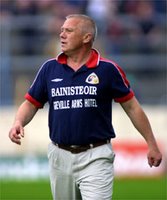The Way of Things
 Not the greatest week for Irish sport, was it? The accelerating pointlessness of our international soccer team, the bewildering collapse of the rugby team, and another lopsided, anti-climactic All-Ireland football final.
Not the greatest week for Irish sport, was it? The accelerating pointlessness of our international soccer team, the bewildering collapse of the rugby team, and another lopsided, anti-climactic All-Ireland football final.All we need now is for Padraig Harrington to test positive for cocaine (those post-Open celebrations at Stackstown Golf Club having gotten out of hand) and Aidan O'Brien to be caught in a compromising position with George Washington for the full set.
But while the All-Ireland wasn't the riveting spectacle we always hope for it to be, after a week of mediocrity there was the consolation of savouring the quality of a Kerry side that now begin to look their legendary predecessors directly in the eye.
The day after last year's All-Ireland final I wrote about having reservations about this Kerry team, following their hammering of Mayo. They needed, I felt, a championship-winning campaign that involved a titanic, defining victory over a similarly serious side, probably Tyrone, to ascend to that nebulous state of 'greatness'.
This year feels different. They had tough games; the three victories which preceded yesterday's were by small margins: two pints over Cork in the Munster final, one over Monaghan in the All-Ireland quarter-final and were two better than Dublin in the semi.
But there no longer seems the need for them to have conquered one of the other great teams of the era at their best. The fact that they appear to have outlived Tyrone as Gaelic football's masters might be part of it. But the simple, unequivocal total of Sam Maguires totted up is the main reason. Eventually, you have to stop speculating about the true worth of a team, stop trying to put their success into the context of the time and simply allow the weight of trophy numbers to win the argument.
Along with Kilkenny's hurling championship victory, Kerry's third All-Ireland in four years seems to have engendered a belated appreciation for the merits of the GAA's dynastic powers. After the vogue for the bench-pressing, wife-ignoring, self-flagellating preparation methods as espoused by the Ulster giants early in the decade, there's a definite re-evaluation of the merits of Kilkenny and Kerry's seemingly unforced cultures of success.
Without suggesting for a moment that the twin pillars of the GAA's intercounty temple don't scourge themselves in the gym and in laps of the winter fields, there's a naturalistic quality about their success that doesn't seem to be the result of the concerted efforts of a group of special, determined men, but rather is the involuntary expression of their people's sporting identity.
Both counties have had to ride out sustained periods where their pre-eminence was challenged over the last 15 to 20 years. Sooner or later other counties will come again, and take joy in knocking Kerry and Kilkenny off their perches. But eventually they'll return to where they belong, stronger and better than ever, restoring that feeling of permanence again. That's just the way it is.
....Read more!











